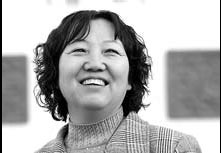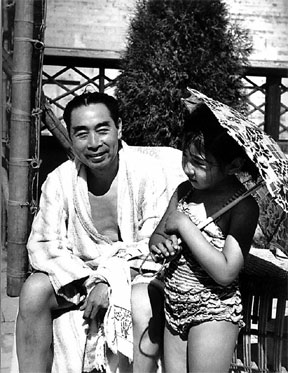Power, no privileges
Zhou Bingjian will keep a low profile among the more than 2,000 delegates at the 11th Chinese People's Political Consultative Conference that began Monday.
She won't wear delicate make-up or a trendy suit. The brown sweater she bought for the meeting was chosen by her Mongolian singer husband. The 56-year-old claims she doesn't have a good eye for fashion.
"My uncle wished us to be ordinary, and never to show off our relationship," the Zhejiang native says.
Zhou is a niece of Zhou Enlai, China's former premier.
|
Zhou Bingjian is proud of her uncle, the late Premier Zhou Enlai. Jiang Dong |
Yesterday marked the 110th birthday anniversary of the great man. With various commemorative activities being held across the country, Zhou feels touched and, of course, very proud of him.
"I don't remember my uncle on that day only," Zhou says. "Though he passed away a long time ago, he continues to live inside me. I always think about him."
Zhou is the youngest daughter of Zhou Enshou, the late premier's youngest brother.
Often as children, Zhou and her five brothers and sisters were taken by her parents to visit Xihua Hall at Zhongnanhai in which the premier worked and lived after 1949.
"My uncle didn't play favorites, and treated us fairly," says Zhou, an inspector at the retired veteran cadre bureau of the Ministry of Finance.
"He was 54 years older than me so we really didn't have much to talk about. I would never have dared to speak out unless he asked me," she says.
In 1968, Zhou volunteered to work in the Inner Mongolia autonomous region countryside, in response to a call from the government.
Rather than shielding her from hardships, the premier supported her decision and managed to find time to have dinner with the 15-year-old, whose father had been sent to jail, due to the "cultural revolution" (1966-76).
"He no longer called me 'Xiao Liu' (little sixth child), but instead addressed me by my full name, which made me feel like he regarded me as an adult for the first time," Zhou says with a smile.
During the meal, the premier asked where she was going to work, and whether or not she had mentally prepared for a tough life.
"He even asked if I like to eat lamb, and urged me to respect local traditions," she adds.
It only took a few months for the city girl to adapt to her new environment. Like other spirited youngsters, what she was afraid of most at that time was not being able to contribute to her country.
Zhou was responsible for herding 1,600 sheep. As she couldn't afford to buy a watch, she worked from sunrise and retired at sunset, then shared a bed with other three graduates in a Mongolian yurt.
She wrote to her uncle regularly via a special-purpose mailbox. Only her aunt Deng Yingchao replied to her letters, because Premier Zhou was too busy with his work.
By the end of 1970, she was recruited into the army at an army base near Beijing and she couldn't wait to show her green uniform to her family.
But she would be disappointed.
Instead of serving as a soldier, the premier asked her to go back to the fields.
|
Premier Zhou with one of younger members of his family. File Photo |
"I didn't dare ask why he was concerned. I had to obey, even though I didn't want to," she says.
So, Zhou returned to Inner Mongolia. Years later, she figured out why she was asked to go back: Some officers tried to transfer their offspring from the countryside to the city, and joining the army was a quick way. Obviously, her uncle was not that kind of a person.
Still, Zhou denies that her uncle was too hard on her. "The closer we were, the stricter he treated us," Zhou says. "He is not our family's premier, he was the country's. If our family's conduct could help him be more respected, we would have no complaints," she adds.
Zhou learnt about her uncle's illness when she went home to join her family in the spring of 1975. She wanted to pay a visit to the hospital, but her request was declined due to the premier's poor health.
However, the premier managed to call her from his sickbed, to ease the girl's disappointment.
"He asked about my living conditions. Then I expressed my wish to study the Mongol language, which made him happy as he always wanted me to mix with local people as much as I could.
"But I never realized that it would be the last time I talked to him," she sighs, pausing for a while.
Premier Zhou Enlai passed away in Jan 1976, a few months after Zhou was admitted to the Inner Mongolia University where she studied Mongolian.
Zhou and her family moved to Beijing in 1994.
"My uncle was a good person. He did his best for the country as well as the people. We are so honored to have had such an extraordinary older generation," Zhou says.
(China Daily 03/06/2008 page20)
















